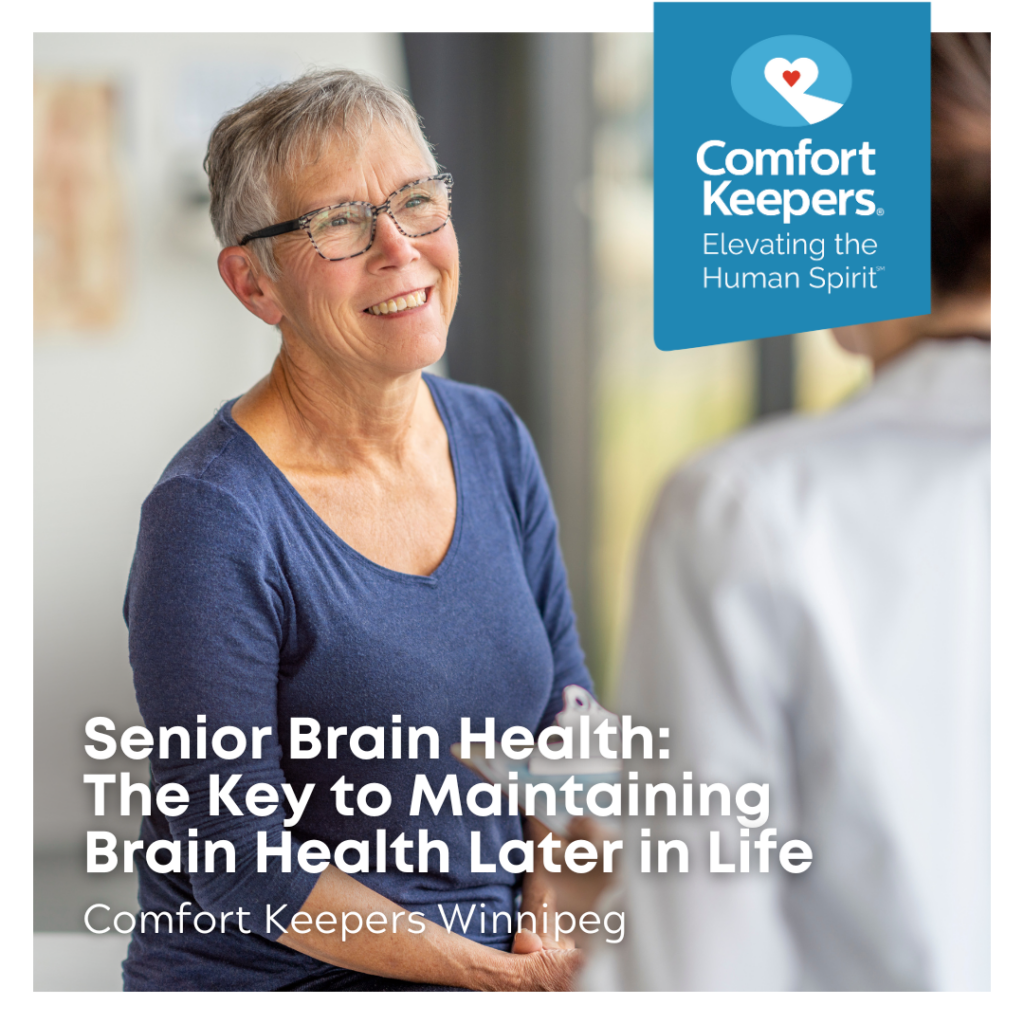Senior Brain Health: The Key to Maintaining Brain Health Later in Life
Seniors and Alzheimers | September 24, 2024

What Every Senior in Winnipeg, MB Needs to Know About Maintaining Optimal Brain Health and Function
Senior Brain Health | When it comes to exploring the brain, with each breakthrough the scientific community makes, new unprecedented questions arise. This allows research to become more focused, it also illuminates that the brain is vastly complex.
Despite its many mysteries, one thing we do know is that the brain, like all our organs, undergoes aging. Its overall volume declines, shrinking by about 5% per decade after 40, which leads to the loss of neural connections. Additionally, reduced blood flow and certain cardiovascular conditions can further contribute to this process.
For seniors, these factors may lead to occasional forgetfulness or lapses in memory. Significant memory loss, however, is not a normal part of aging and may be indicative of Alzheimer’s disease or dementia.
Suppose your aging loved ones are experiencing memory loss or have had problems with language skills, perception, or other mental functions. In that case, you must address these concerns with a physician.
Senior Brain Health FAST FACTS: Even though the human brain represents only two percent of the body’s weight, it receives nearly a quarter of the body’s total blood supply.
Senior Brain Health: Keep the Brain Healthy
Research has indicated that there are several ways that older adults (and those of all ages) can help reduce the risk of cognitive decline – many of which are beneficial for other aspects of the body. Encourage your aging loved ones to incorporate the following best practices into their lifestyle. Be sure that, before beginning any new exercise regimen or diet, your loved ones consult with a physician and dietician.
Senior Brain Health: Four Tips to Maintain Optimal Health and Function
#1. Stimulation:
In the last few years, there have been numerous research studies in the area of neurological plasticity, which refers to the brain’s ability to structurally modify in response to new experiences. This “re-wiring” of nerve cells is actually what is at the center of most cognitive and physical rehabilitation practices. However, it essentially serves the same function for those looking to keep their brains healthy, and it can be done simply by learning new skills or keeping the brain regularly “exercised” through puzzles or games. Many suggest that seniors enroll in a class or other form of organized learning – which will help not only in developing new skills but also in cultivating socialization.
#2. Exercise Regularly:
While it’s not exactly news that exercise is good for the body, it may come as a surprise to some that regular exercise also has quite an impact on mental health. Physical activity improves cardiovascular health, which in turn helps supply the brain with blood. It also helps in developing new/increasing existing neural connections (see neurological plasticity above), allowing the brain to be more adaptive. Research suggests that regular exercise can also significantly reduce mental stress. Some seniors may choose to join a class with close friends for exercise, but it can just as easily be done at home. The key is to ensure that the heart rate is elevated through moderate activity, for at least 20-30 minutes every day.
#3. Watch Your Diet:
The food we consume has a direct effect on our mental wellbeing and health. To operate at its optimum level, the brain requires fuel in the form of vitamins, minerals, and other essential nutrients. If your current diet consists primarily of salt, sugar, fat, and refined/processed foods, consider switching things around. Studies show that diets consisting of fruits, vegetables, whole grains, sources of B vitamins, and lean meats can significantly reduce anxiety levels and even the risk of depression.
#5. Stay Social:
Although it’s not entirely understood how socialization bolsters brain health, studies show that a correlation between having strong social connections and longer life expectancy does exist. Interaction, whether it be with friends, family members, or next-door neighbours, appears to reduce the risk of cognitive decline and improve overall mental well-being. This is especially evident in those who volunteer their time to help others. Try reaching out through organizations, community centers, or schools to see how you can help make a positive impact on others – and the health of your brain.
What unifies all of these best practices for maintaining brain health? The key, as countless scientific studies would suggest, is engagement. In this case, it means getting out and meeting new people versus staying inside and watching TV, choosing to find healthy alternatives to cheap fast food, and finding ways to help not only yourself but those in your community as well.
Comfort Keepers® Can Help
If your loved ones are working to improve their mental well-being and want to incorporate the aforementioned best practices into their lifestyle, we can help.
Comfort Keepers® Winnipeg Offers a Wide Range of Private Home Senior Care Services
For families concerned about the health and well-being of aging loved ones, we can help with homecare services including, Alzheimer’s and dementia care, in-home personal care, respite care, specialized care, in-home nursing, end-of-life care, senior living transition services, and much more!
Comfort Keepers® professional caregivers provide services to ensure safety, health, and happiness without the stress of moving to an assisted living or rehabilitation facility. Individually tailored care plans account for living arrangements, medical issues, physical restrictions, personalities, expectations, and more.
Our Interactive Caregiving™ Approach Enables Top-Notch Homecare
The Interactive Caregiving™ provides a system of care that addresses safety, nutrition, mind, body, and activities of daily living (ADLs). Our compassionate caregivers can provide a personalized home care plan for your loved one, allowing them to enjoy a healthier, safer, and more meaningful retirement at home.
Comfort Keepers® is the Most Trusted Name in Senior Care in Winnipeg
Our in-home caregivers ensure our seniors are physically, socially, and mentally engaged. In addition, we provide options, activities, events, and resources for seniors that might otherwise not be available.
Locally Owned and Operated In-Home Personal Care for Seniors
Our caregivers live and work in the Winnipeg area. We know the area and how to assist our clients using local resources. Comfort Keepers® Winnipeg is here to help you and your loved ones get the best care possible. If you live in Winnipeg and require homecare services for senior personal care and wellbeing, contact Comfort Keepers® at (204)-488-4600.
Accredited Home Care for Seniors in Winnipeg
Comfort Keepers® Winnipeg is accredited with Exemplary Standing with Accreditation Canada. Accreditation is an intensive process in which industry experts examine an organization’s processes, policies, and procedures against quality standards. To achieve accredited status, Comfort Keepers® offices met or exceeded the rigorous standards for Home Care companies, as defined by Accreditation Canada.
References:
- Harvard Health Publications. “12 Ways to Keep Your Brain Young.” Web. 2006.
- Everyday Health. “How to Stay Sharp As You Age” by Krisha McCoy. Web. 2017.
- Brain Facts. “What We Know – and Don’t Know – About Aging.” Web. 2012.
- National Institute on Aging. “The Aging Brain.” Web. 2017.
Individualized Home Care Options
Long-Term Home Care, 24 Hour Home Care & Short Term Care Options Customized for You







